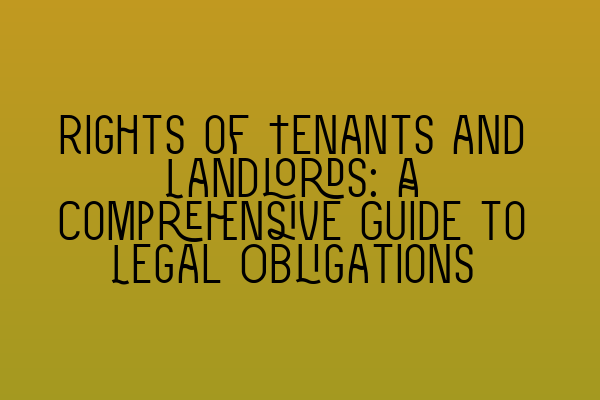Welcome to the blog of SQE Property Law & Land Law, where we provide comprehensive information on the rights and obligations of tenants and landlords. Whether you’re a tenant seeking to understand and protect your rights, or a landlord looking to navigate the complexities of property law, this guide is here to help.
Understanding Tenancy Agreements
One of the first things both tenants and landlords should familiarize themselves with is the tenancy agreement. This legal document outlines the terms and conditions of the tenancy, including rent, deposit, responsibilities, and rights of both parties. To learn more about tenancy agreements, take a look at our SQE 1 Practice Exam Questions article.
Tenants’ Rights
Tenants have certain rights guaranteed by the law to ensure fair and safe living conditions. Some of the key tenant rights include:
- Right to live in property: A tenant has the right to occupy the property as long as they fulfill their obligations, unless there is a lawful reason for eviction.
- Right to a safe and habitable property: Landlords are obligated to maintain the property in a reasonable state of repair, ensuring it is safe and habitable.
- Right to privacy: Tenants are entitled to privacy and the landlord must give appropriate notice before entering the property, except in cases of emergencies.
- Right to protection against unfair eviction: The law provides protection against retaliatory and unfair eviction, ensuring that tenants cannot be evicted without just cause.
To delve deeper into tenants’ rights and learn about additional protections, check out our SQE 1 Practice Mocks FLK1 FLK2 article.
Landlords’ Obligations
Landlords have a series of legal obligations to fulfill in order to ensure the well-being of their tenants. Some of the key obligations include:
- Obtaining necessary licenses and permits: Depending on the type of rental property, landlords may be required to obtain specific licenses and permits.
- Repairs and maintenance: Landlords must ensure that the property is maintained in good repair, including necessary repairs for the smooth functioning of amenities.
- Deposit protection: Landlords are required to protect tenants’ deposits by placing them in a government-approved scheme.
- Adhering to health and safety regulations: Landlords must comply with health and safety regulations to ensure the property meets the required standards.
To gain a comprehensive understanding of landlords’ obligations, we recommend exploring our SQE 2 Preparation Courses article.
Resolving Disputes
Disputes between tenants and landlords can arise, and it is important to understand the options available for resolution. Some of the common dispute resolution methods include:
- Mediation: A neutral third party facilitates communication and helps tenants and landlords find mutually agreeable solutions.
- Arbitration: An arbitrator, appointed by both parties or a designated institution, makes a binding decision based on the evidence presented.
- Court proceedings: In some cases, disputes may need to be resolved through court proceedings, where a judge will make a final ruling.
If you need guidance on resolving a tenant-landlord dispute, our team at SQE Property Law & Land Law can assist you. Feel free to reach out to us for expert advice.
Staying Updated on Property Law
Property law is constantly evolving, and it is crucial for both tenants and landlords to stay informed about any changes that may impact their rights and obligations. We recommend referring to our SQE 1 Preparation Courses article to ensure you’re up to date with the latest developments.
Final Thoughts
Understanding the legal rights and obligations of tenants and landlords is essential for maintaining healthy and respectful relationships. By familiarizing yourself with tenancy agreements, tenants’ rights, landlords’ obligations, dispute resolution methods, and ongoing changes in property law, you will be better prepared to navigate any challenges that may arise.
For further assistance and expert legal advice, do not hesitate to contact SQE Property Law & Land Law – your trusted partner in property law matters.
Don’t forget to check out our SRA SQE Exam Dates article to ensure you’re aware of important examination dates if you’re pursuing a career in law.
